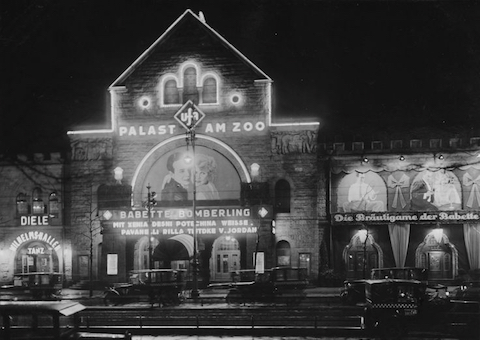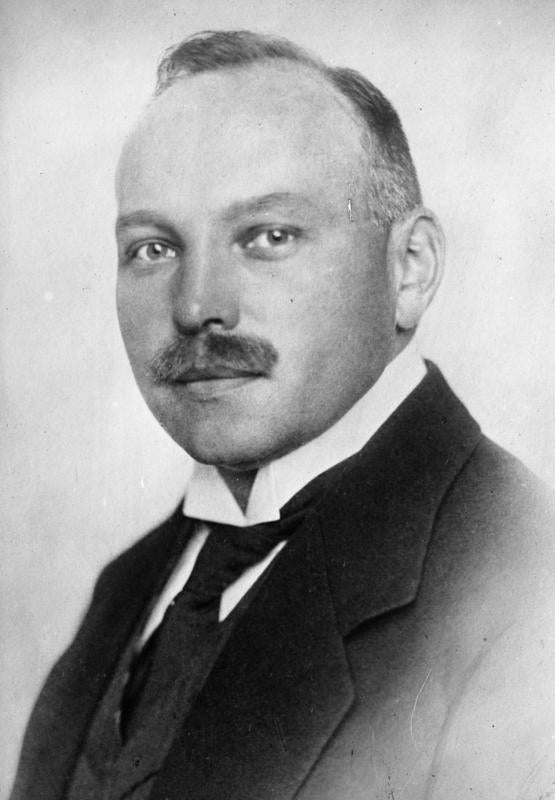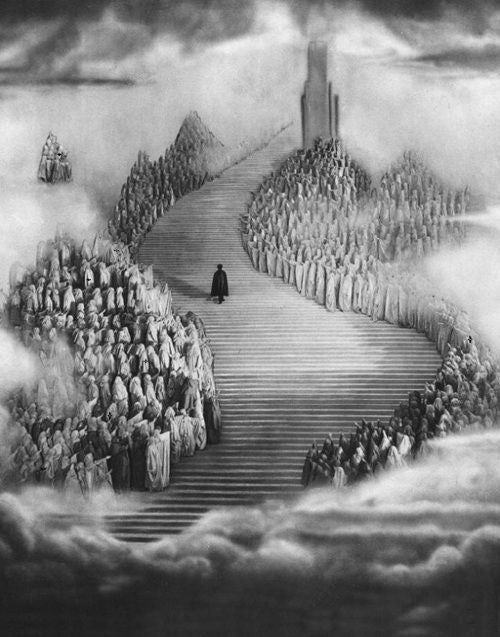
UFA-Palast am Zoo cinema in Berlin
On December 18, 1917, the film company Universum Film AG (UFA) was founded in Berlin, the result of an edict of the military government of General Erich Ludendorff, although the man behind the scenes was Emil Georg von Strauss (pictured right), Director of the Deutsche Bank. The initial reason for the merger of the German Nordic Film Co., the Oliver Film Co., Messter Film, and Projektions A.G. “Union,” among other smaller film companies, was ostensibly to control the mass media and counter the devastating effect of Allied film propaganda. But for the captains of industry, including members from several other large banks, Bosch, AEG and Hamburg-Amerika Line, it was to set up a German film company that could compete after WWI with the French and Americans. And indeed, by controlling distribution and first run theaters, UFA established a monopoly similar to the way the American majors would a few years later. In Weimar, UFA became identified with art house classics of Expressionism, and when the Nazis came to power, a state-owned monopoly. After UFA was dismantled by the Allies in post-WWII Germany, the company rose again in the 1990s as a producer of television fare, most recently the successful series, Deutschland 83 (Sundance TV). Many years ago, I wrote my master’s thesis on the founding of UFA.

For UFA’s 100th anniversary, CineGraph Babelsberg staged a conference in Berlin, organized by Jürgen Kasten, Ursula von Keitz, and Philipp Stiasny, which included papers by German and international scholars. The conference dealt with a myriad of topics involving the competing agendas of politics and commerce that had already characterized UFA’s founding. My own paper dealt with the dismissal of almost all of UFA’s Jewish employees on March 29, 1933, two days before the Nazi boycott of Jewish businesses, and months before Goebbels’ Propaganda Ministry codified into law the exclusion of German Jews from all aspects of public life.
These were some of the highlights of the conference: Jürgen Kasten discussed UFA’s system of contract production in the 1920s, whereby the UFA co-financed independent film productions, which allowed the company to beef up its production schedule while limiting financial risk. Ursula von Keitz presented her ongoing research on UFA’s feature-length “Kulturfilms” (cultural documentaries) in the 1920s, especially as they pertained to women’s bodies and feminist issues. Ralf Forster analyzed UFA’s advertising films—actually industrials—, especially the Henkel (soap) Company sponsored feature, Washing, the Wash, and Well-Being (1931-32), which was popular enough to be rereleased and remade repeatedly. Jeanpaul Goergen continued with industrials, produced by AFIFA, the company that initially arose from the UFA ruins after the founding of the German Federal Republic.

Unfortunately, I had to miss a panel discussion with Wolf Bauer, CEO of the new UFA, as well as papers by Christian Rogowski (on Ludwig Berger), Rolf Giesen (UFA animation), Daniel Rafaelic (UFA documentary on Egypt), Tobias Nagl (UFA Sci-fi), Janelle Blankenship (UFA medical films), and Philipp Stiasny (The Man Without a Name, 1932).
Saturday started with an eye-opening analysis of the UFA production, Die Prinzessin und der Geiger (The Blackguard, 1925, pictured right), which featured Alfred Hitchcock in the roles of screenwriter, art director, and probable director, after the credited director, Graham Cutts, left the production to pursue an extra-marital affair. The discussion of UFA’s foreign affairs continued with Wolfgang Fuhrman’s presentation of the company’s efforts to establish cinemas and distribution outlets in Brazil in the 1920s and 1930s. Next, Frederick Lang discussed the establishment of Continental Films in Paris, a somewhat covert UFA subsidiary set up to produce French films during the Occupation that successfully engaged some of the country’s most prominent directors and actors.
Mila Ganeva lectured on the interrelationship between fashion and UFA’s costume design department, especially during the war years, when clothing materials were rationed. Finally, Stefanie Mathilde Frank discussed post-WWII German remakes of UFA films from the Third Reich, especially the licensing of popular show tunes, which apparently provided a steady income for UFA after it had completely ceased film production. A panel discussion about UFA and its historiography featured Rainer Rother, who organized a UFA exhibition at the Deutsche Kinemathek. A final panel with the conference’s organizers led to some criticism from the audience. One participant commented on the heterogeneity of the conference and the fact that so little focus had been placed on the films themselves and film production. While there was some truth to it—although the evening screenings did deal with individual films, just not the UFA classics—, it is also a truism that such conferences are often a mixed bag, given the diverging interests of its participants. The conference did shed light on areas that had previously remained hidden. A conference publication is planned that will hopefully round out some of the loose ends.
< Back to Archival Spaces blog






 Mobile Navigation
Mobile Navigation


Comments